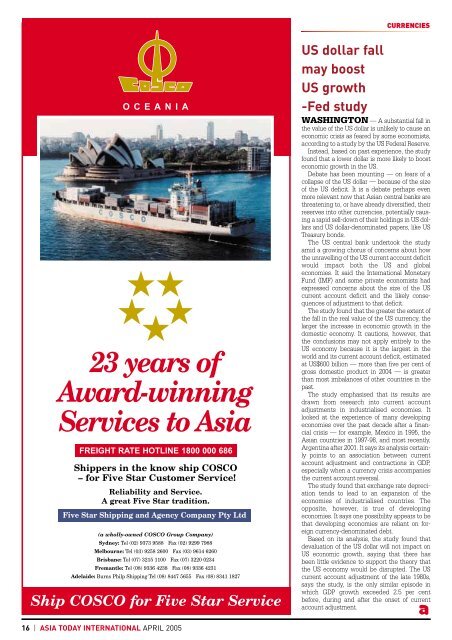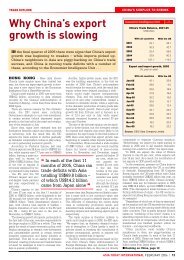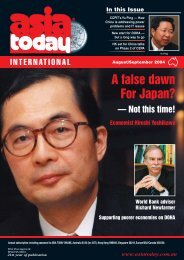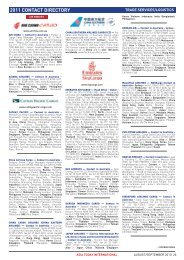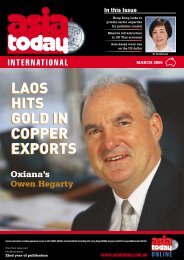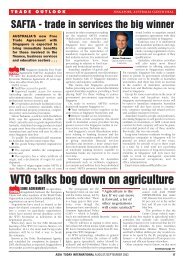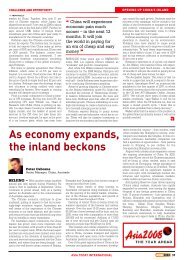indonesia - Asia Today International
indonesia - Asia Today International
indonesia - Asia Today International
You also want an ePaper? Increase the reach of your titles
YUMPU automatically turns print PDFs into web optimized ePapers that Google loves.
SHIPPING REVIVAL IN INDIAOCEANIA23 years ofAward-winningServices to <strong>Asia</strong>FREIGHT RATE HOTLINE 1800 000 686Shippers in the know ship COSCO– for Five Star Customer Service!Reliability and Service.A great Five Star tradition.Five Star Shipping and Agency Company Pty Ltd(a wholly-owned COSCO Group Company)Sydney: Tel (02) 9373 9588 Fax (02) 9299 7988Melbourne: Tel (03) 9258 2600 Fax (03) 9614 6260Brisbane: Tel (07) 3215 1100 Fax (07) 3220 0234Fremantle: Tel (08) 9336 4238 Fax (08) 9336 4231Adelaide: Burns Philp Shipping Tel (08) 8447 5655 Fax (08) 8341 1827Ship COSCO for Five Star ServiceCURRENCIESUS dollar fallmay boostUS growth-Fed studyWASHINGTON — A substantial fall inthe value of the US dollar is unlikely to cause aneconomic crisis as feared by some economists,according to a study by the US Federal Reserve.Instead, based on past experience, the studyfound that a lower dollar is more likely to boosteconomic growth in the US.Debate has been mounting — on fears of acollapse of the US dollar — because of the sizeof the US deficit. It is a debate perhaps evenmore relevant now that <strong>Asia</strong>n central banks arethreatening to, or have already diversified, theirreserves into other currencies, potentially causinga rapid sell-down of their holdings in US dollarsand US dollar-denominated papers, like USTreasury bonds.The US central bank undertook the studyamid a growing chorus of concerns about howthe unravelling of the US current account deficitwould impact both the US and globaleconomies. It said the <strong>International</strong> MonetaryFund (IMF) and some private economists hadexpressed concerns about the size of the UScurrent account deficit and the likely consequencesof adjustment to that deficit.The study found that the greater the extent ofthe fall in the real value of the US currency, thelarger the increase in economic growth in thedomestic economy. It cautions, however, thatthe conclusions may not apply entirely to theUS economy because it is the largest in theworld and its current account deficit, estimatedat US$600 billion — more than five per cent ofgross domestic product in 2004 — is greaterthan most imbalances of other countries in thepast.The study emphasised that its results aredrawn from research into current accountadjustments in industrialised economies. Itlooked at the experience of many developingeconomies over the past decade after a financialcrisis — for example, Mexico in 1995, the<strong>Asia</strong>n countries in 1997-98, and most recently,Argentina after 2001. It says its analysis certainlypoints to an association between currentaccount adjustment and contractions in GDP,especially when a currency crisis accompaniesthe current account reversal.The study found that exchange rate depreciationtends to lead to an expansion of theeconomies of industrialised countries. Theopposite, however, is true of developingeconomies. It says one possibility appears to bethat developing economies are reliant on foreigncurrency-denominated debt.Based on its analysis, the study found thatdevaluation of the US dollar will not impact onUS economic growth, saying that there hasbeen little evidence to support the theory thatthe US economy would be disrupted. The UScurrent account adjustment of the late 1980s,says the study, is the only similar episode inwhich GDP growth exceeded 2.5 per centbefore, during and after the onset of currentaccount adjustment.16 | ASIA TODAY INTERNATIONAL APRIL 2005


